Kategorie: ‘Information, Kommunikation und Elektronik’
German Study Award: Silver goes to Dominik Šišejković
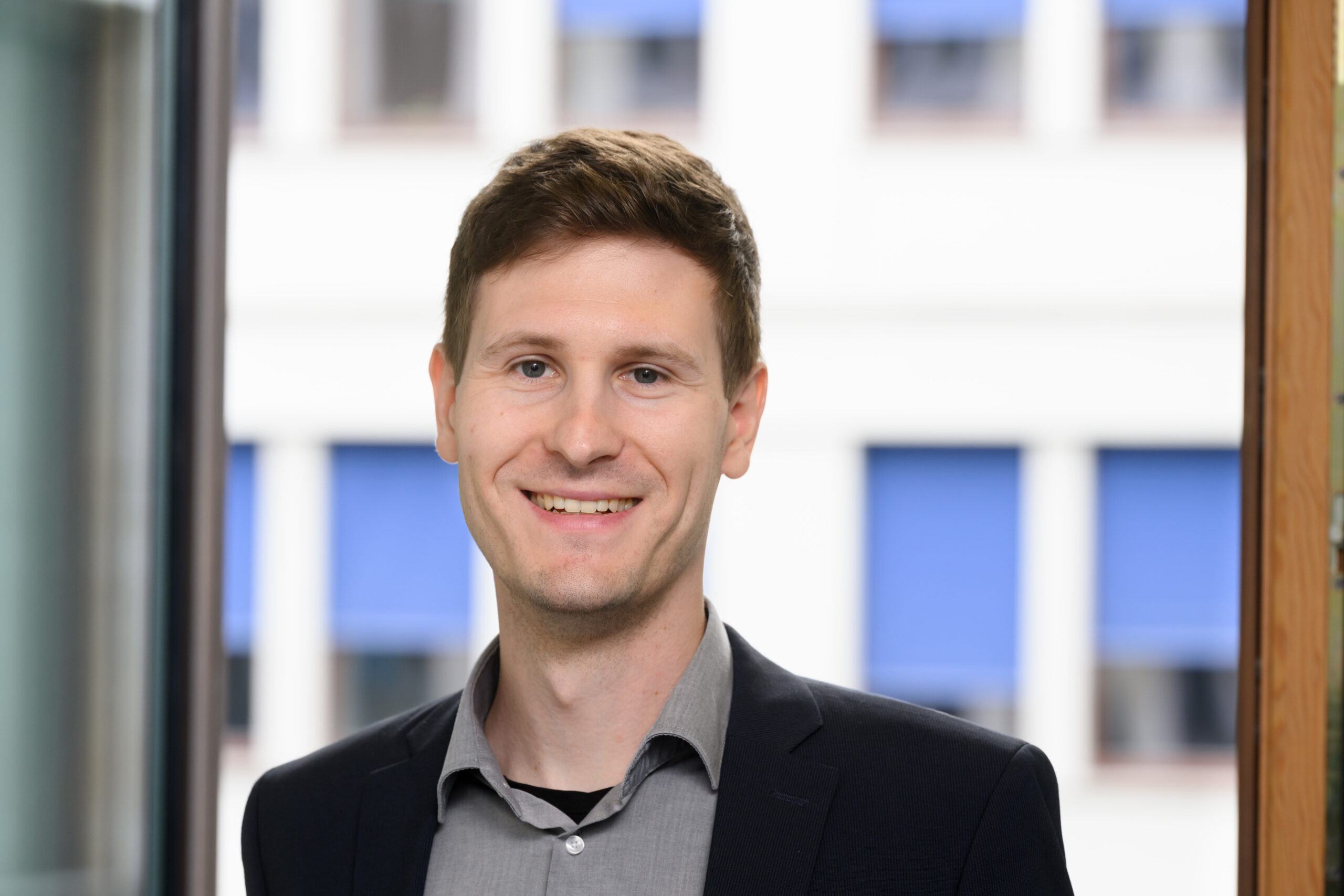
Award winner Dominik Sisejkovic ©David Ausserhofer
His excellent dissertation, Development of trustworthy microelectronics – from theory to practice, will be honored by the Körber Foundation with the German Study Award 2023 on November 27 at the German Parliamentary Society in Berlin. Dominik Šišejković will receive the second prize in the Natural and Technical Sciences section from Bundestag President Bärbel Bas.
The focus of his doctoral thesis is the question of how hardware can be protected against decentralized modifications. This is all because hardware Trojans represent one of the greatest security threats of the modern age. Such a carefully designed modification allows attackers to gain access to critical infrastructure, extract secret information or even shut down systems at the worst possible moment.
“In this work, we take a step-by-step approach to understanding logic encryption, from its basic mechanics to software implementation to an in-depth analysis of its security properties in the age of machine learning,” explains Dominik Šišejković, a PhD student at RWTH Aachen University in the Department of Electrical Engineering.
One possible solution is hidden in logic encryption, a leading technique for securing hardware. The results were bundled into an industry-proven encryption method that provides a secure way to protect hardware.
The German Study Award is one of the most highly endowed prizes for young scientists in Germany. Each year, it honors outstanding young scientists from all disciplines. The Körber Foundation awards prizes totaling more than 100,000 euros for excellent dissertations of particular social significance.
CO2For-IT: A data room for the timber industry with a focus on climate protection
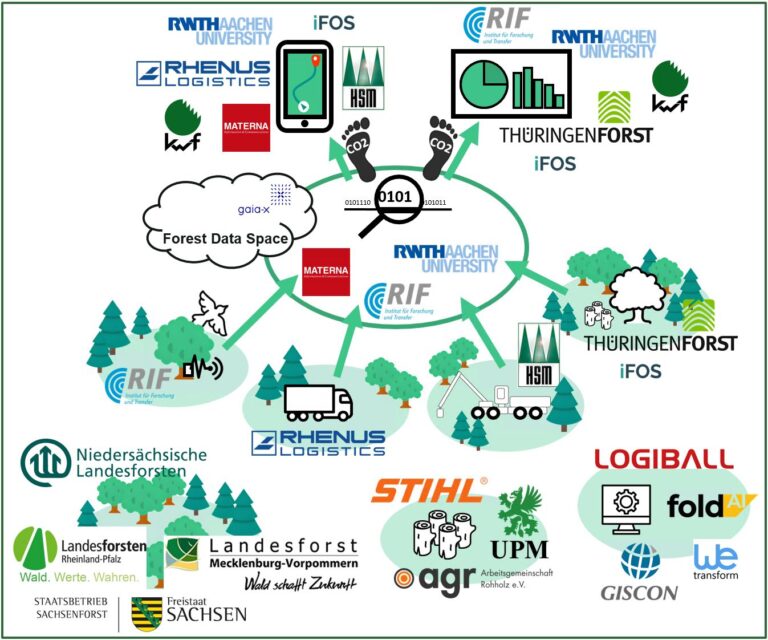
Project partners in CO2For-IT. © Institute for Man-Machine Interaction RWTH Aachen University
A new initiative to promote a climate-friendly timber industry was launched in July 2023. The CO2For-IT project, supported by the Federal Ministry of Economics and Climate Protection, aims to create a “Forest Data Space” to enable the sustainable use of wood from forests.
The Forest Data Space will provide data on the carbon footprint of the entire timber value chain and therefore support the development of data-based solutions for climate protection. The project is led by Materna Information & Communications SE and coordinated by the Dortmund Institute for Research and Transfer (RIF e.V.). Other partners include RWTH Aachen University, Rhenus Forest Logistics GmbH & Co. KG, HSM Hohenloher Spezial Maschinenbau GmbH & Co. KG, Forstliches Forschungs- und Kompetenzzentrum Gotha (ThüringenForst – AöR) and Kuratorium für Waldarbeit und Forsttechnik e. V. (KWF). In addition, foldAI and iFOS GmbH are collaborating with the project.
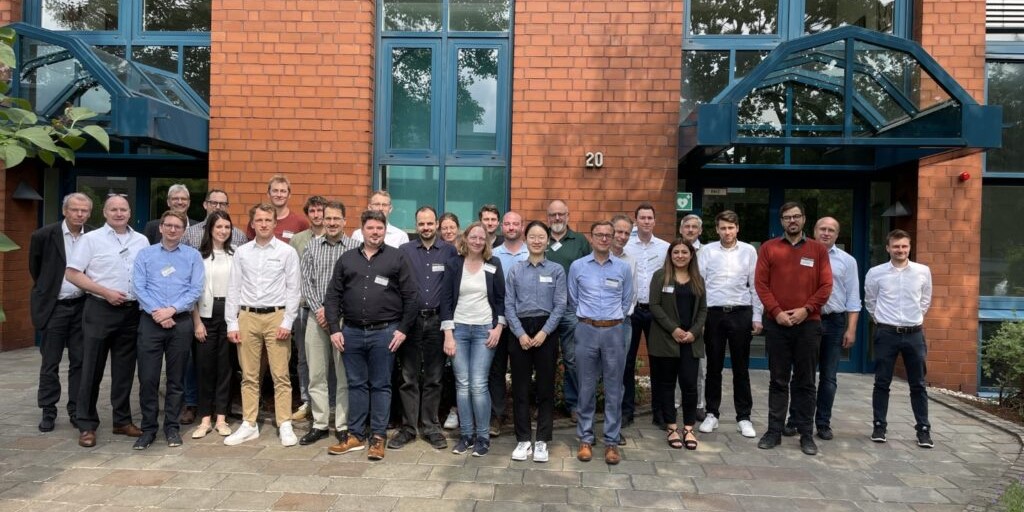
© Institute for Man-Machine Interaction RWTH Aachen University
For more information visit: KWH 4.0 | CO2For-IT (kwh40.de) (only in german)
New Perspectives for Communication Technology: A German-Japanese Partnership
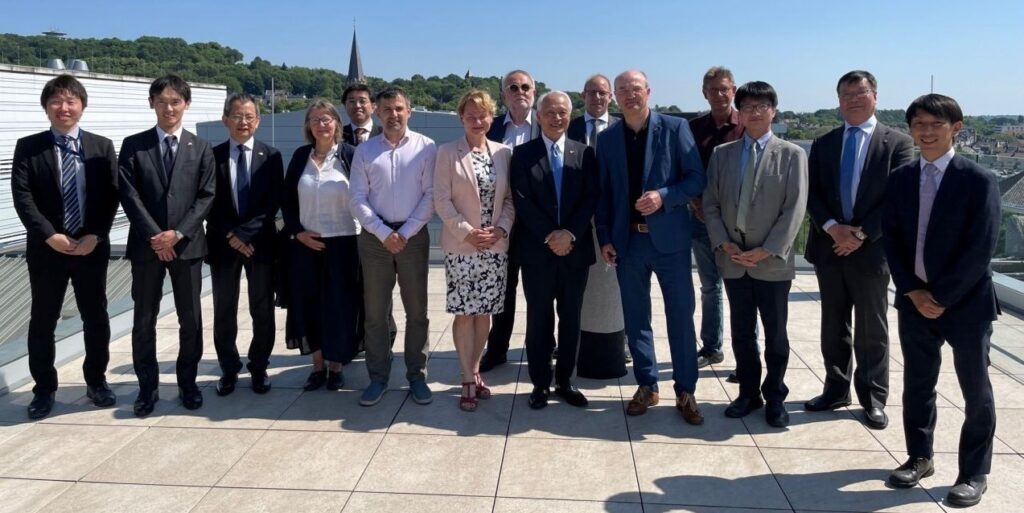
A delegation from the National Institute of Information and Communication Technology (NICT) in Japan visited RWTH Aachen University for the signing of a Memorandum of Understanding. © RWTH Aachen University
RWTH University has started an exciting cooperation in the field of 5G/6G mobile communications technology with the National Institute of Information and Communication Technology (NICT) in Japan. This was sealed by a memorandum of understanding that Professor Ulrich Rüdiger and Professor Hideyuki Tokuda, President of NICT, signed together in June. They received a delegation from NICT at RWTH Aachen University.
The Memorandum of Understanding is intended to strengthen and expand academic cooperation between both partner institutions. This includes the exchange of scientists and students, collaborative research projects, publications and the transfer of knowledge on 5G/6G mobile communications technology.
The cooperation was initiated as part of the BMBF-funded research programme “6GEM Research Hub”, which is coordinated by Professor Haris Gačanin from the Chair of Distributed Signal Processing at RWTH. In this project, RWTH Aachen University, Ruhr University Bochum, Dortmund University of Technology and the University of Duisburg-Essen, as well as the Fraunhofer Institute for Material Flow and Logistics, the Fraunhofer Institute for Microelectronic Circuits and Systems, the Fraunhofer Institute for High Frequency Physics and Radar Techniques and the Max Planck Institute for Security and Privacy are researching future communication technologies in 6G mobile communications technology.
Source: RWTH press release: Research Partnership With NICT in Japan – RWTH AACHEN UNIVERSITY – English (rwth-aachen.de)
Excellent placement in global university ranking

© Kurt Beyer
In electrical engineering, RWTH Aachen is one of the three best German universities. This is the result of the internationally highly regarded QS Ranking by Subjects of the British information service provider Quacquarelli Symonds. Presented in its latest version, the subject ranking is based on various criteria that are weighted according to subject. An online reputation survey among university graduates and employers accounts for between 40 and 100 percent of the total points and is considered the most important indicator. Citations, which scientific papers from universities receive on average, account for up to 60 percent. For some engineering and natural science subjects, international research networks are also taken into account.
The Aachen University of Excellence was able to place itself on the winner’s podium in many subjects throughout Germany and is also convincing in an international comparison. In ten subjects, it placed among the 100 best worldwide. RWTH did particularly well in the subjects of mining engineering with 15th place and mechanical engineering with 19th place.
For more information: www.topuniversities.com
“Hex-Hex”: Text – Thesis written!

The right magic formulas are taught in the courses of the “Schreibwerkstatt E-Technik”. The face-to-face course offers bachelor’s and master’s students at the Faculty of Electrical Engineering and Information Technology customized preparation for writing their upcoming seminar papers or dissertations. Participants benefit from acquired basic knowledge and writing strategies, which can be further developed in an individual online consultation. Upon successful participation, students earn a certificate and 3 CP, which can be credited towards elective credits.
International students must prove a German language level of at least C1.2 as a participation requirement for the course. The online writing consultation takes place in either German or English.
Registration deadline: March 27 – April 3, 2023
Dates:
| Group 1 02.84000 |
Group 2 02.84000 |
| Wednesdays April 19, 2023 Mai 3, 2023 Mai 17, 2023 June 6, 2023 each from 2.30 to 5.30pm |
Wednesdays April 26, 2023 Mai 10, 2023 Mai 24, 2023 June 21, 2023 each from 2.30 to 5.30pm |
Registration is via user account at Language Center.
Contact for inquiries: schreibzentrum@sz.rwth-aachen.de
Top placements in international ranking
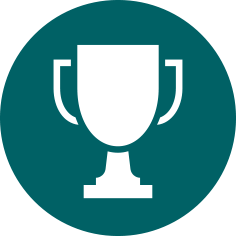
The portal Research.com informs in the newly published ranking that the Electrical Engineering and Information Technology of the RWTH achieved the 2nd place in the Germany-wide comparison. Internationally, RWTH ranks 65th in this discipline.
Research.com evaluates the frequency of citations of scientific articles and other publications for the ranking. Data from the OpenAlex and CrossRef databases are used for the evaluation. Researchers are ranked using the D-index, a variation of the H-index, which measures citations to their scientific papers within a discipline. All those who achieve a D-index of at least 30 are included in the rankings. The sum of the D-indexes of all listed scientists of a university is then decisive for its placement in the university ranking.
Accordingly, the following RWTH Electrical Engineering and Information Technology professors have qualified for the ranking:
- Dirk Uwe Sauer from the Chair of Electrochemical Energy Conversion and Storage Systems Engineering.
- Rik W. De Doncker from the Chair of Power Electronics and Electrical Drives
- Heinrich Meyr from the Chair for Distributed Signal Processing
- Antonello Monti from the Institute for Automation of Complex Power Systems
- Max Lemme from the Chair of Electronic Components AMICA – Advanced Microelectronic Center Aachen
- Steffen Leonhardt from the Chair of Medical Information Technology
- Petri Mahönen from the Chair and Institute of Networked Systems
- Rainer Leupers from the Chair of Software for Systems on Silicon
Into 6G era with innovative measurement technology
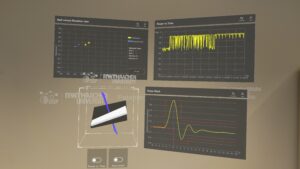
The team from the Chair of Distributed Signal Processing around Prof. Dr. Haris Gačanin will provide insights into the world of tomorrow at Mobile World Congress in Barcelona on February 27. Together with industry partner Rohde & Schwarz, they will present the interactive and immersive visualization of measurement technology using augmented reality. The “XR-Wireless” technology developed as part of the 6GEM research project is used for this. The partners are meeting the challenge of developing innovative test and measurement technology that masters the acceleration of new technology towards 6G.
Encouraging women to take up MINT professions – support for ZDF heute journal
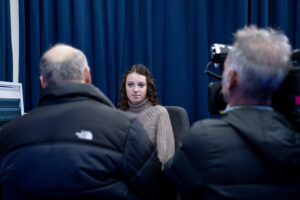
BA student Helena in an interview with the ZDF heute journal team. Photo: C. Antweiler
At the end of January, the team from ZDF heute journal visited the Institute for Communication Systems at RWTH Aachen University for a report. The report provides insights into the topic of “women in MINT subjects”, which are sometimes chosen even less by women and girls, such as mathematics, computer science, natural science and technology. Editor Peter Böhmer from the North Rhine-Westphalia State Studio researched the reasons for the low quota of women at RWTH Aachen University and what approaches could be taken to change this.
Through interviews with various female RWTH students, including our BA student Helena, as well as with Univ. Prof. Dr. rer. nat. Aloys Krieg, Prorector for Teaching, the heute journal team was able to gain an impression. The Institute for Communication Systems and a lecture by Prof. Peter Jax provided the pictorial framework for the report.
You can find the report in the ZDF Mediathek.
Gold and bronze at the 2023 Innovation Awards ceremony
Congratulations to all winners of this year’s Innovation Awards for pioneering university projects whose contribution particularly enriches the Aachen region as a location for innovation.
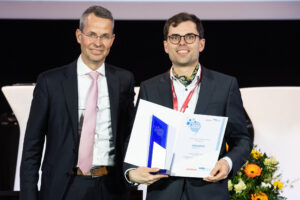
Professor Malte Brettel and award winner Dr.-Ing. Moritz Joseph from Team Neureka.
Gold went to the team Neureka around Professor Rainer Leupers from the Chair of Software for Systems on Silicon with a development kit on hardware – and software level for neuromorphic AI chips in edge applications.
Neuromorphic computing systems replicate the way the human brain works, as they combine computation and memory units and thus enable an enormous increase in performance in artificial intelligence. Neuromorphic chips already available today promise tens to hundreds of times improved energy efficiency, latency, and space efficiency. Neureka has successfully met the challenge of making the complicated system design of this technology accessible to industry.
The Hardware Development Kit integrates purchased neuromorphic chips into an existing computing system, allows validation of neuromorphic hardware, and is a development platform for market-ready AI devices. The software development kit enables easy programming and simulation of AI applications on neuromorphic systems. Software developers can thus bring low-risk AI applications to disruptive neuromorphic hardware and reduce the energy consumption of AI.
Customers of both developments are industrial users, mobile device manufacturers and smart city IoT device providers.
Silver went to an electromagnetically heatable nanomodified stent for the treatment of hollow organ tumors, developed in collaboration by Ioana Slabu of the Institute of Applied Medical Engineering and Benedict Bauer of the Institute of Textile Engineering.
Bronze went on the one hand to the team working with Mathias Bode from the Institute of Technical Combustion in cooperation with the Jülich Supercomputing Centre. Their software-as-a-service platform JuLES is considered a key technology for the climate-neutral transformation of industrial processes.
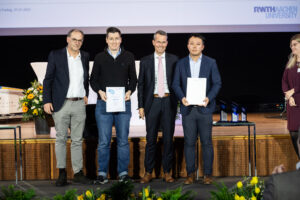
Professor Heinz Pitsch with Mathis Bode to the left and Weihan Li to the right after the handover of the certificate by Professor Malte Brettel.
On the other hand, the team from the Chair of Electrochemical Energy Conversion and Storage Systems Technology, headed by Professor Dirk Uwe Sauer, was also pleased to receive bronze. The award honored the development of a digital battery twin to increase efficiency and safety in the application field.
Lithium-ion batteries are emerging as the technology for energy storage, especially in the field of electromobility, due to their low cost and high energy density. However, their performance degrades over time. Condition monitoring and prediction of battery aging not only benefits safety, maintenance, and asset optimization, but is also the starting point for technical and economic analysis of potential second-life applications.
The developed cloud battery management system covers seven key functions to control the entire life cycle of batteries, enabling online monitoring of aging, prediction of aging progression, and optimization of operation strategy to limit aging.
The innovation contributes to the acceleration of the energy transition and the electrification of transport. It also opens up commercial opportunities for a wide range of industries, such as digital certificates for batteries, battery warranties and insurance, and predictive and timely warning of safety-critical conditions.
Otto Junker Awards 2022
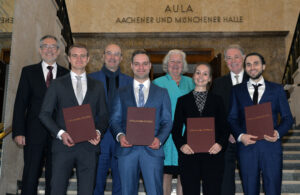
Image: Ryan Benkert, Daniel Fallnich, Josefin Wilkes and Tomasz Engelmann (front, from left) were awarded the Otto Junker Prize. Wolfgang Bleck, Ulrich Rüdiger, Marianne Conradt and Udo vom Berg congratulated the winners (back, from left).
Photo: Andreas Schmitter
Awarded for outstanding academic achievements
Ryan Benkert, Tomasz Engelmann, Daniel Fallnich and Josefin Wilkes received the 2022 Otto Junker Prize for their outstanding academic achievements. The Otto Junker Prize is conferred annually to RWTH students from the Faculty of Electrical Engineering and Information Technology and the Materials Science and Engineering Division of the Faculty of Georesources and Materials Engineering.
The Otto Junker Foundation was founded in 1970 by Dr.-Ing. E.h. Otto Junker. As a former RWTH, he felt intimately connected to the University throughout his life and particularly valued the scientific exchange. The aim of the foundation is to support young scientists and to promote numerous individual projects. Udo vom Berg, Chairman of the Supervisory Board of Otto Junker GmbH, and RWTH Rector Ulrich Rüdiger presented the awards at a ceremony. Professor Wolfgang Bleck, Chairman of the Foundation’s Scientific Advisory Board, and District Mayor Marianne Conradt congratulated the winners.
Ryan Benkert was born in January 1997 and did his Abitur in Gilching. He then studied electrical engineering, information technology and computer engineering at the RWTH and completed his master’s degree with a grade of 1.0. The master’s thesis with the topic “Out-of-Distribution Detection for Unsupervised Perception Systems” was written at the Chair for Integrated Systems of Signal Processing under the direction of Professor Gerd Ascheid. During his studies, he completed a stay at the Georgia Institute of Technology, funded by the Deutschlandstipendium and a Georgia Tech scholarship. He also completed three internships in the US, one of which was in Cupertino at Apple. Benkert is currently receiving his doctorate at the Georgia Institute of Technology in Atlanta, USA.
Daniel Fallnich, born in 1996, comes from Hanover and completed a voluntary science year in the field of production technology after leaving school. He then studied electrical engineering and information technology at the University of Hanover in the bachelor’s program. He switched to the RWTH for his master’s degree and studied electrical engineering, information technology and computer engineering. Here he was on Dean’s list of the best students. Fallnich also completed a six-month course at the TU Delft in the Department of Quantum and Computer Engineering. The master’s thesis with the topic “Design of a Hardware Architecture for the Niederreiter Cryptosystem” was written at the Chair for Integrated Digital Systems and Circuit Design under the direction of Professor Tobias Gemmeke. Fallnich is currently working at IBM in Böblingen.



